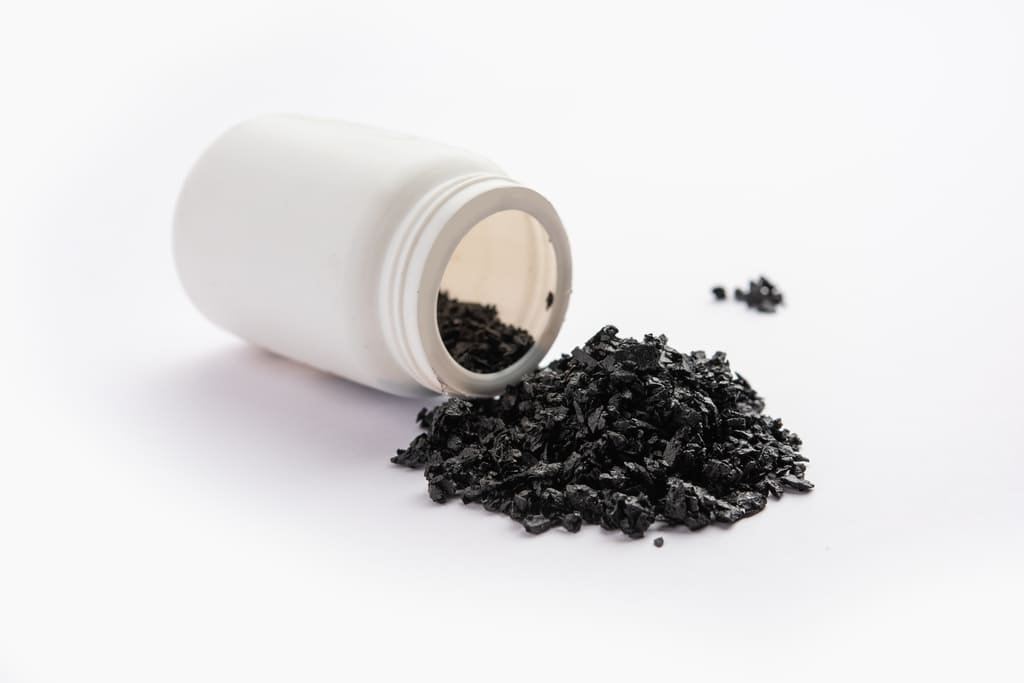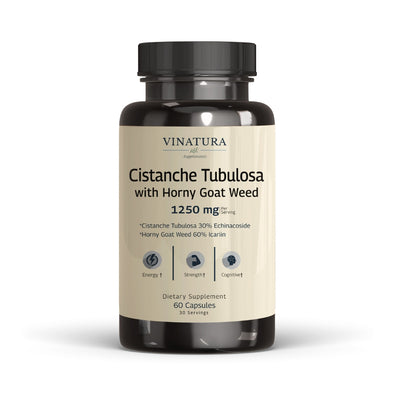
Shilajit And Ashwagandha: Differences & Combo Benefits
For centuries, Shilajit and Ashwagandha are two powerful and popular herbal supplements used in traditional Ayurvedic medicine. Both are believed to offer various health benefits, such as supporting vitality and stress management and are commonly used in wellness practices. In this blog post, we will explore Shilajit and Ashwagandha's differences and combo benefits to help you understand which supplement may be best for your needs.
Before exploring further, please read the disclaimer located at the end of this webpage.
Shilajit Benefits
Shilajit is a type of mineral droplet found in the cracks of rocks during hot weather. It's formed from the decomposition of plant material within the rock that occurred thousands of years ago. The biological transformation of plant material is squeezed out of the stone through geological pressure and heat.
Here are some main benefits of Shilajit:
- Enhancement of both physical and mental energy [1]
- Prevention of Alzheimer's disease [2] - Alzheimer's disease is a progressive neurodegenerative disorder causing memory loss and cognitive decline due to the accumulation of abnormal protein deposits in the brain.
- Antiulcerogenic and anti-inflammatory agents [3]
- Immunomodulation [3]
- Antistress [3]
- Prevention of aging and creation of rejuvenation [3]
- Enhancing the property of other drugs: Shilajit is mixed with an herbal solution of certain plants because it is believed to make them more effective. For example: Shoria robusta (sala), Bachanania lactifolia (piala)...[3]
- Antioxidant [3]

Ashwagandha Benefits
Ashwagandha, also known as Withania somnifera, is an adaptogenic herb utilized in traditional medicine for its stress-relieving properties and potential benefits in promoting overall health. It is believed to help regulate the body's response to stress, enhance energy levels, and support various physiological functions.
Here are some main benefits of Ashwagandha:
- Antistress [4]
- Antitumor Properties [4]
- Antioxidant Effect [4]
- Immunomodulation [4]
- Hemopoetic Effect [4]
- Rejuvenating Effect [4]
- Antiulcerogenic and anti-inflammatory agents [5]
- Effect on leucocytosis [5]

What Are the Differences Between Shilajit And Ashwagandha?
For easy to understand and grasp the overview differences between Shilajit and Ashwagandha, we create a comparison table for your convenience below:
|
Comparative characteristics |
Shilajit |
Ashwagandha |
|
Physical form |
A sticky, tar-like resin |
Typically ground into a powder |
|
Color |
Dark brown to black, presenting a tar-like appearance |
Beige to light brown |
|
Main benefits |
Revitalizing qualities |
Stress management and cognitive support |
|
Source |
Derived from the decomposition of plant and microbial matter in mountainous regions, often found oozing from rocks |
Extracted from the roots of the Withania somnifera plant |
|
Bioactive Compounds |
Contains fulvic acid, minerals, and various organic compounds |
Contains withanolides, alkaloids, and steroidal lactones |
|
Dosage |
300 - 500mg per day |
300 - 600mg per day |
|
Research Status |
Limited clinical research; some studies suggest potential health benefits, but more research is needed |
Well-studied, with a growing body of research supporting its various health benefits |
Comparison Table of Shilajit and Ashwagandha
Shilajit may be preferred for those seeking vitality and energy, while Ashwagandha is often chosen for its stress-adaptation properties. Shilajit and Ashwagandha offer various health benefits, but it's challenging to say which is better.
The "better" choice depends on your health goals and how your body responds to each supplement. It's advisable to make decisions based on your specific needs and preferences, with guidance from a healthcare professional when necessary.
Explore more:
- Shilajit Vs Tongkat Ali - Difference And Surprised Combinatio
- How Long Does Ashwagandha Take To Work?
Can You Take Shilajit And Ashwagandha Together?
Taking Shilajit and Ashwagandha together is beneficial because it combines their unique properties for a synergistic effect, enhancing energy, cognitive function, and overall well-being.
The adaptogenic nature of both substances complements each other, offering comprehensive stress support, and their traditional use together in Ayurveda suggests a harmonious combination for holistic health.
When incorporating Shilajit and Ashwagandha into your wellness routine, it's important to choose high-quality Shilajit products from reputable brands. Given the growing popularity of these supplements, the market is flooded with options, making it crucial to ensure you're selecting pure and authentic Shilajit. By opting for well-reviewed and certified products, you can safely harness the powerful synergy of Shilajit and Ashwagandha for optimal health.
Combo Benefits of Shilajit And Ashwagandha
The combination of Shilajit and Ashwagandha offers a synergistic array of health benefits. When taken together, their benefits increase manifold. Here are some potential combined benefits:
- Improving your energy levels, mood, and immunity
- Supporting cognitive function
- Promoting sexual health
- Contributing to healthy aging
- Alleviating stress and anxiety
- Regulating blood sugar levels
- Reducing chronic inflammation
- Improving male fertility
- Preventing anemia
- Promoting weight loss
You may also like: Cistanche Vs. Shilajit: The Comprehensive Comparison
This powerful combo provides a holistic approach to well-being, addressing various physical and mental health aspects.

Side Effects Of The Shilajit And Ashwagandha
Shilajit and Ashwagandha have stimulating effects; taking them together could lead to unwanted effects. Here are the side effects of Shilajit and Ashwagandha:
- Difficulty sleeping and increased restlessness.
- Increased heart rate, dizziness, or rashes while.
- Excessive Sleepiness
- Digestive Issues
- Blood Sugar Changes
- Allergic Reactions
It's crucial to use these supplements cautiously, adhere to recommended dosages, and consult a healthcare provider before starting any new supplementation regimen, especially when combining multiple supplements.
Dosage When Taking Ashwagandha And Shilajit Together
When combining Ashwagandha and Shilajit, it's advisable to start with the lower end of the recommended dosage for each and monitor how your body responds.
Always follow the recommended dosage instructions on the supplement labels. It is essential to adhere to its daily dosage to gain the benefits of Ashwagandha and Shilajit. The daily dosage of both should be between 250 and 500 mg.
For the best results, you should take Shilajit on an empty stomach in the morning or at least an hour before a meal. This timing ensures optimal absorption and utilization by the body.
Ashwagandha can be taken in the morning or early afternoon, given its traditional use as an adaptogenic herb to enhance energy and focus throughout the day.
Conclusion
In conclusion, Shilajit and Ashwagandha are powerful herbal supplements with potential health benefits. While they have some similarities regarding their antistress and immunomodulation effects, they also have some distinct differences. Depending on your individual needs and preferences, either one or a combination of both could benefit you. Shilajit and Ashwagandha can naturally support your overall health and well-being with suitable dosage and usage.
References
- [1] Stohs, S. J., Singh, K., Das, A., Roy, S., & Sen, C. K. (2017). Energy and Health Benefits of Shilajit. Elsevier EBooks, 187–204. https://doi.org/10.1016/b978-0-12-805413-0.00012-0
- [2] Carrasco-Gallardo, C., Guzmán, L., & Maccioni, R. B. (2012). Shilajit: A Natural Phytocomplex with Potential Procognitive Activity. International Journal of Alzheimer’s Disease, 2012, 1–4. https://doi.org/10.1155/2012/674142
- [3] Agarwal, S., Khanna, R., Ritesh Karmarkar, Md. Khalid Anwer, & Khar, R. K. (2007). Shilajit: a review. Phytotherapy Research, 21(5), 401–405. https://doi.org/10.1002/ptr.2100
- [4] Singh, B., Dagenais, S., Assistant, B.-R., & Mishra, L.-C. (2000). Scientific Basis for the Therapeutic Use of Withania somnifera (Ashwagandha): A Review. Alternative Medicine Review
- [5] Singh, N., Bhalla, M., Prashanti de Jager, & Marilena Gîlcă. (2011). An Overview on Ashwagandha: A Rasayana (Rejuvenator) of Ayurveda. African Journal of Traditional, Complementary and Alternative Medicines, 8(5S). https://doi.org/10.4314/ajtcam.v8i5s.9
Author

Product Disclaimer
Including an ingredient or study does not evaluate, endorse, or recommend any Vinatura product or any third-party product. Some ingredients discussed may not be used in any Vinatura product.
The content of the articles has not been evaluated by the Food and Drug Administration (FDA) and is not intended to promote or endorse any specific product. Any products sold on this website are not intended to diagnose, treat, cure, or prevent any disease.
Opinions and Endorsements
Any claims, statements, or opinions expressed in the articles are those of the author(s) and do not necessarily reflect the views or opinions of the manufacturers of the dietary supplement products. The products sold on this website are separate from the content of the articles and are not directly endorsed or associated with the information presented here.
Liability Disclaimer
The author(s) of the articles, website, and manufacturers of the dietary supplement products do not assume any liability for any potential consequences arising from the use of the information provided in the articles. Ingredient effects, dosages, and safety vary by individual, formulation, and context; some ingredients interact with medications or may be unsuitable during pregnancy or lactation. It is recommended that individuals consult with a qualified healthcare professional before making any dietary or lifestyle changes, including the use of dietary supplements.
Product Usage
Please refer to the product labels and packaging for specific usage instructions and guidelines for the dietary supplement products sold on this website.
Customer Support
For any concerns or questions regarding the dietary supplement products, please contact our customer support team, who will be more than happy to assist you.






Leave a Comment
Be the first to comment.
What do you think?